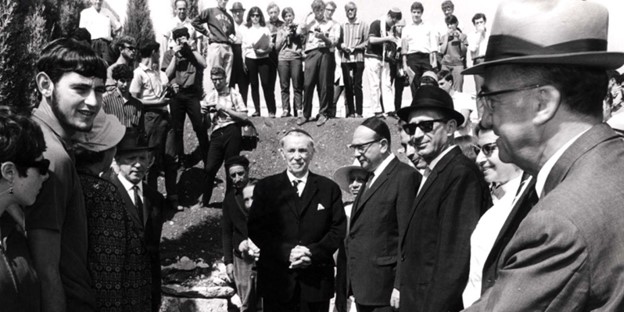A German Protestant minister, Hermann Maas not only stood for Zionism, but for the Jewish people during the Holocaust, many of whom he saved from the Nazis.
A Long Line of Pastors
Born in 1877 in Baden, Germany, Hermann Maas came from a long line of pastors, a calling he also followed. Soon after beginning his lifelong ministry, Maas became an early supporter of the Zionist movement. Not only did Maas support the Jewish people, he advocated for close ties and reconciliation between Christians and Jews, a true bridge builder.
In 1933, on the same day that Hitler ordered a boycott against Germany’s Jews, Maas set sail on a trip to the Holy Land. The visit made an impression on the German pastor — he visited Jewish settlements, seeing those German Jews who had already fled Nazi persecution, and studied with Hebrew scholars. Those who Maas met were impressed with their new Christian friend’s ability to speak fluent Hebrew.
‘Pastor of the Jews’
When Maas returned to Germany, the Nazis persecuted him as the “pastor of the Jews.” But Maas stood firm in his closeness to the Jewish people. In fact, the Nazi persecution only made him defy them more. He wrote for a Zionist newspaper, translated Hebrew poems, and sent his daughter on a trip to the Holy Land to teach olim (immigrants) how to weave.
Maas also invited Jewish leaders to celebrate Christmas Eve with him, and in turn, he celebrated Passover with them even as the war raged, all of them praying for God’s deliverance. One rabbi warned Maas about his habit of attending Jewish prayer services, fearing the pastor’s life was in danger, but the pastor continued to live a life of faith.
Destined for the Camps
Maas’ friendship with Germany’s Jewish community also led him to help save those destined for Nazi camps. Using his connections to obtain visas for those being deported, he saved many of the oldest and most frail — those who would surely have been the first to die.
But Pastor Maas’ activism and advocacy for the Jewish people finally caught up with him. Using letters he had written against Hitler’s regime and its treatment of the Jews, the Nazis forced him to retire from the pulpit in 1943, and sent him to a concentration camp in 1944. Maas was imprisoned there until the Americans liberated the camp.
After the war, in 1950, Hermann Maas was the first German Gentile to be invited to the state of Israel. In 1964, Maas was recognized as Righteous Among the Nations, as seen above at Yad Vashem, for the advocacy, support, and love he showed the Jewish people during a life lived well.



